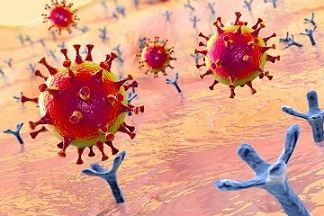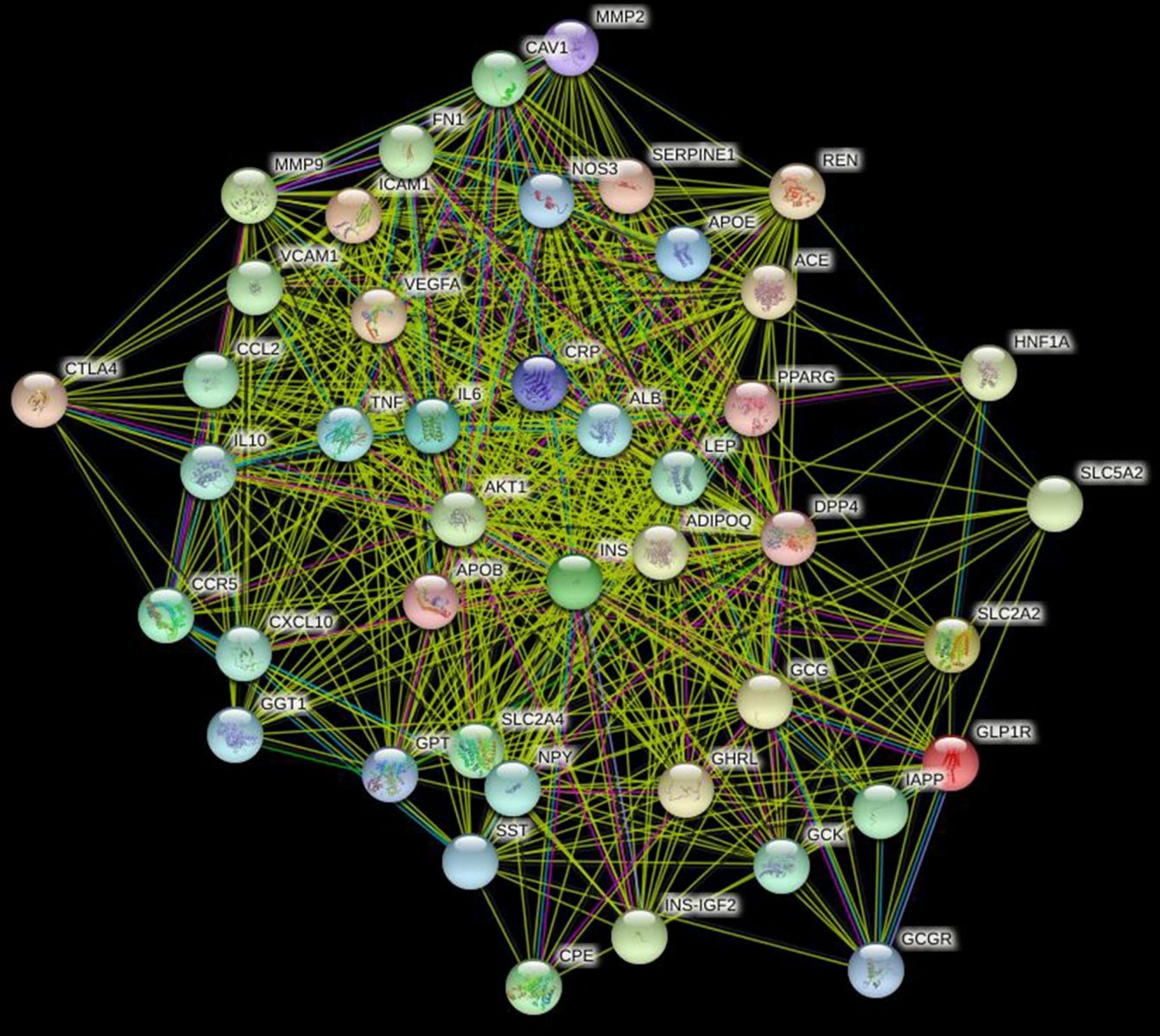Study Reveals SARS-CoV-2 Binding To Host DPP4 Receptors Causes Dysregulation Of Proteins Associated With Diabetes, Leading To Severe COVID
Source: Medical News - DDP4, Diabetes And COVID-19 Severity Jan 18, 2022 4 years, 1 month, 6 days, 22 hours, 11 minutes ago
A new study by researchers from the department of Endocrine and Metabolism at the Affiliated Hospital of Shaoxing University, Zhejiang-China has found that SARS-CoV-2 virus binding to human host DPP4 receptors causes dysregulation of proteins associated with diabetes, which in turn often leads to disease severity in COVID-19.

To date, it has been found that most patients with diabetes are more likely to be infected with COVID-19 disease, and the risk of death is significantly higher than ordinary patients.
The
DPP4 dipeptidyl peptidase-4 protein is one of the functional receptors of the SARS-CoV-2 coronavirus. Exploring the relationship between diabetes mellitus targets and DPP4 is particularly important for the management of patients with diabetes and COVID-19.
The study team intended to study DDP4 interaction through the protein interaction network in order to find a new clue for the management of patients with diabetes with COVID-19.
Diabetes mellitus targets were obtained from GeneCards database. Targets with a relevance score exceeding 20 were included, and DPP4 protein was added manually. The initial protein interaction network was obtained through String. The targets directly related to DPP4 were selected as the final analysis targets. Importing them into String again to obtain the protein interaction network. Module identification, gene ontology (GO) analysis and Kyoto encyclopedia of genes and genomes (KEGG) pathway analysis were carried out respectively.
The impact of DPP4 on the whole network was analyzed by scoring the module where it located. 43 DPP4-related proteins were finally selected from the diabetes mellitus targets and three functional modules were found by the cluster analysis. Module 1 was involved in insulin secretion and glucagon signaling pathway, module 2 and module 3 were involved in signaling receptor binding.
The scoring results showed that LEP and apoB in module 1 were the highest, and the scores of INS, IL6 and ALB of cross module associated proteins of module 1 were the highest.
The study findings showed that COVID-19 may affect DPP4 and key proteins in patients with diabetes mellitus, leading to high mortality of diabetes mellitus combined with COVID-19. DPP4 inhibitors and IL-6 antagonists can be considered to reduce the effect of COVID-19 infection on patients with diabetes.
The study findings were published in the peer reviewed journal: Scientific Reports (Nature).
https://www.nature.com/articles/s41598-021-03912-6
Thailand
Medical News would like to add that the study findings also has implications in the long term health aspects or long COVID issues especially with infections involving the new variant Omicron as it has been found that the new variant is also shifting focus away from the ACE2 receptors to other human host receptors including the DD4 receptors.
https://www.thailandmedical.news/news/breaking-study
-alarmingly-shows-omicron-could-be-possibly-evolving-to-shift-its-focus-on-human-receptors-from-ace2-to-ddp-iv,-similar-to-mers
The (SARS-CoV-2 virus, which causes the coronavirus disease 2019 (COVID-19) has nearly spread to every country around the world since it first emerged in Wuhan-China in December 2019.
To date, more than 331 million people globally have been infected with the SARS-CoV-2 coronavirus and its variants and more than 5.56 million people have died from COVID-19.
https://www.worldometers.info/coronavirus/
Although social distancing, masking, restrictions on social gatherings and other methods to help reduce the transmission of SARS-CoV-2 were enacted by most governments, healthcare workers have continued to be frustrated by the lack of information and availability of effective treatments. As a result, patients suffering from severe COVID-19 have had to rely on mechanical ventilation or oxygen supplementation to improve their condition, rather than treating the infection itself.
A number of COVID-19 vaccines have received emergency use authorization from various government bodies around the world. These vaccination schemes, in addition to the development of several COVID-19-specific treatments, have rapidly decreased the amount number of patients suffering from severe disease. However, due to the novelty of COVID-19, there remains limited information on how specific comorbidities, such as diabetes, interact with this disease. In general, diabetic patients appear to be more likely to contract SARS-CoV-2 and succumb to severe forms of this disease as compared to non-diabetic patients.
The
Dipeptidyl peptidase-4 (DPP4) protein receptor, which is also known as CD26, is a serine exopeptidase that is present in a dimeric form on the surface of cells. DPP4 is associated with a wide variety of functions in mammals, some of which include the regulation of hormone, neuropeptide, and cytokine activity, as well as a mediator of interactions between cells and the matrix, as well as between cells.
Dipeptidyl peptidase-4 (DPP4) is expressed on the surface of various cells and plays a significant role in glucose metabolism. As a result, DPP4 inhibitors have been widely used to treat patients with diabetes. More specifically, these hypoglycemic drugs antagonize insulin secretion by preventing DPP4 from decomposing glucagon-like peptide-1 (GLP-1), thereby controlling blood glucose levels and improving both glucose tolerance and insulin resistance.
As a result of an increased risk of infection and severe outcomes of COVID-19 in patients with a history of diabetes, researchers have looked to DPP4 inhibitors for their utility in treating this patient population.
The study team explored the relationship between DPP4 and diabetes targets in the management of COVID-19.
The study team identified targets by searching for ‘diabetes mellitus’ in the GeneCards database and included any targets with a relevance score above 20.
These protein targets were then imported into the Search Tool for the Retrieval of Interacting Genes/Proteins (STRING) database to obtain the protein-protein interaction map, with any targets directly related to DPP4 screened for further research.
The STRING tool was used to carry out the enrichment analysis of gene ontology (GO) function. Comparatively, the Kyoto encyclopedia of genes and genomes (KEGG) pathways analysis was used to predict its action mechanism and construct the network diagram.
 Interaction network of DPP4 related protein
Interaction network of DPP4 related protein
The module 1, where DPP4 is located, was used as an internal network, whereas the cross-module association of the internal network is screened out to further evaluate the impact of DPP4 on the network and possible pathways.
In all, a total of 1,031 diabetes mellitus targets and 43 targets directly related to DPP4 were obtained. Three functional modules were obtained by cluster analysis, including 17 nodes in the first module, 14 nodes in the second, and 13 nodes in module three.
Importantly through GO and KEGG analysis, the study team found that the target of module 1 was primarily enriched in insulin secretion and the glucagon signal transfection pathway. Comparatively, the targets of modules 2 and 3 were mainly enriched in signaling receptor binding.
Interestingly module 1 was also found to contain 190 cross-module associations, which accounted for 33% of all observed network associations.
The study findings showed that within module 1, LEP and apoB proteins were found to have the highest scores, thereby indicating their likely ability to have cross-module effects. Furthermore, INS, IL-6, and ALB in module 1 had the highest scores, which supports the hypothesis that this module has an impact on the aforementioned protein interactions.
Numerous past studies have demonstrated that soluble CD26 levels are reduced in the serum of patients with diabetes.
Past study observations have found that unregulated glucose metabolism and inflammation can increase the risk of mortality with COVID-19. Since DPP4 has an important role in glucose metabolism, the use of DPP4 inhibitors could assist in reducing the severity of COVID-19 through this pathway, as well as through their proven use in preventing lung inflammation and reducing lung injury.
The study team by analyzing the functional modules and diabetes targets that are associated with DPP4, concluded that their findings support the hypothesis that COVID-19 alters the expression of DPP4 in diabetic patients through its interactions with INS, leptin, IL-6, and other proteins.
This causes disorders of glucose metabolism and inflammation to arise, thereby increasing the chance of mortality in diabetic patients with COVID-19.
The study findings support the future study of DPP4 inhibitors in the treatment of COVID-19 in animal models of diabetes. These studies could subsequently provide the basis for clinical trials on DPP4 inhibitors for the treatment of COVID-19 in diabetics.
Thailand
Medical News would like to add that Quercetin, EGCG from Green tea and curcumin are all excellent inhibitors of DDP4.
https://www.ncbi.nlm.nih.gov/labs/pmc/articles/PMC7072504/
https://www.frontiersin.org/articles/10.3389/fphar.2021.779652/full
https://onlinelibrary.wiley.com/doi/full/10.1002/fft2.71
https://onlinelibrary.wiley.com/doi/abs/10.1111/jfbc.13686
https://www.meta.org/papers/natural-phenolic-compounds-potentiate/31666589
https://jram.journals.ekb.eg/article_125732.html
https://www.ncbi.nlm.nih.gov/labs/pmc/articles/PMC7036097/
https://sciforum.net/paper/view/6241
https://www.future-science.com/doi/10.4155/fmc.15.49
For more on
DDP4 receptors and COVID-19, keep on logging to Thailand Medical News.
Read Also:
https://www.thailandmedical.news/news/quercetin-emerging-as-one-of-the-must-take-covid-19-supplements-especially-when-considering-the-omicron-variant-and-long-covid-19-issues
https://www.thailandmedical.news/news/covid-19-supplements-numerous-studies-show-that-the-phytochemical-quercetin-not-only-inhibits-sars-cov-2-but-helps-in-other-aspects-of-covid-19
https://www.thailandmedical.news/news/breaking-supplements-for-covid-19-quercetin-emerging-as-an-adjuvant-for-covid-19-treatments
https://www.thailandmedical.news/news/breaking-german-study-shows-that-phytochemicals-from-turmeric-inhibit-sars-cov-2-in-vitro-and-could-be-used-as-potential-therapeutics-for-covid-19
https://www.thailandmedical.news/news/covid-19-therapeutics-computational-screenings-show-a-variety-of-natural-phytochemicals-could-have-efficacy-against-sars-cov-2-including-egcg-from-gre
https://www.thailandmedical.news/news/must-read-covid-19-supplements-chinese-researchers-in-wuhan-discover-that-curcumin-has-antiviral-effects-on-certain-coronaviruses
https://www.thailandmedical.news/news/covid-19-herbs-scientist-study-phytochemicals-found-in-green-tea-such-as-theaflavins-,-catechins-and-myricetins-as-potential-antivirals-against-sars-c

